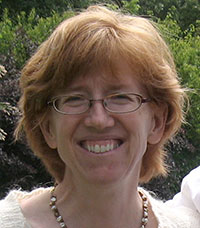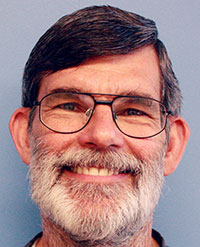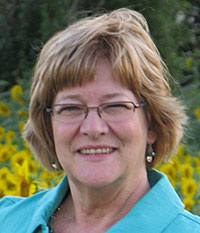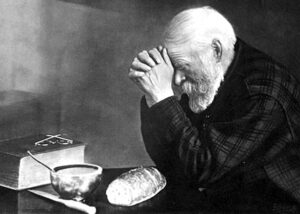A mayor in Texas made headlines this past December when he proclaimed 2014 as “the Year of the Bible.”
“Throughout the history of the United States, one of the most important influences that has shaped our country into a distinctive nation, none may have been more profound or enduring than the Bible,” Mayor Tom Hayden of Flower Mound, Tex., said in his proclamation. He invited as many as wanted to participate to read through the whole Bible in a year by spending roughly 15 to 20 minutes a day on daily reading.
“His desire [is to] bring our town back to a biblical foundation, which our country was founded and built upon,” reads TheBible2014.com, a website that was created as part of the initiative.
Meanwhile, a number of publications are hailing 2014 as “Hollywood’s Year of the Bible.” Son of God, slated to open in theatres this month, tells the story of Jesus’ life. In November, Noah—a $130 million epic with Russell Crowe (Gladiator, A Beautiful Mind) in the titular role—will come to the screen.
In December, two more biblically based films will hit theatres: Exodus, directed by Ridley Scott (Alien, Blade Runner), tells the story of the ancient Israelite people’s liberation from Egypt, with Christian Bale (best known for portraying Batman in The Dark Knight trilogy) playing Moses; and Mary, Mother of Christ is a prequel to Mel Gibson’s 2004 feature, The Passion of the Christ.
“The uptick in biblical movies is a testament to the ongoing power of those ancient narratives to capture the hearts and minds of the masses,” ReligionNews.com writer Jonathan Merritt noted last month.
But with this interest in the Bible throughout popular culture, how familiar are members of Mennonite Church Canada with the Bible? If biblical literacy is going down, what might some of the reasons be? What resources are available to people who want to study their Bible more seriously? And what are some of the benefits of spending time reading the Bible?
As part of Canadian Mennonite’s Year of Reading Biblically, I put these questions to six leaders from throughout the Mennonite church: a Mennonite Church Canada executive; a Mennonite history professor; a Bible professor; a Christian Formation minister from Mennonite Church U.S.A.’s Western District Conference; and two pastors who lead, or have led, MC Canada congregations.
Don Penner, who has been in ministry for 27 years, currently as pastor of Shantz Mennonite Church, Baden, Ont., says that, sometimes ploughing through books like Leviticus and Chronicles might be tough. At the same time, the Bible can connect readers to God as well as a greater story of God’s work in the world. Readers can also glean solace from biblical figures who have gone through situations we find ourselves in today.
“It’s not just a spiritual discipline of buckling down and ploughing ahead; it’s life-giving for me,” he says. “It gives me energy and hope and passion. . . . Like a good meal, I just keep coming back to that restaurant.”
Decrease in familiarity with the Bible
It is ironic, Carol Penner (no relation to Don Penner) points out: In an age when information is available at our fingertips via the Internet, people are less familiar with the Bible than previous generations were.
“Talking to pastors, I think people would agree with me,” she says. A pastor for 12 years, she recently left The First Mennonite Church congregation in Vineland, Ont., to lead Lendrum Mennonite Brethren Church in Edmonton. “It’s a generalization, but it’s a generalization that’s accurate.”
What are the reasons for this decline in biblical familiarity?
“People are busy,” she says. “It’s not that they don’t think it’s important, but they tend not to put a lot of time into biblical study.”
And when it comes to a church’s sermon series, for younger generations at least, topical studies are often more popular than biblical studies. “The older generation was always into Bible study,” Carol says. “Biblical literacy was ingrained in them, and in the younger generation it’s harder to find that.”
Dan Epp-Tiessen, associate professor of Bible at Canadian Mennonite University (CMU), Winnipeg, believes the decline in biblical familiarity has something to do with the strength of Sunday school programs in the Mennonite church. “Our Sunday school programs are getting more and more watered down,” he says. “When I was a kid 55 years ago and went to Sunday school, Sunday school went all year round, every Sunday of the year, unless Sunday fell on Christmas and New Year’s.”
Today, most churches do not offer Sunday school during June, July and August, and they also take a break around Christmas to coincide with school holidays.
While he does not want to sound alarmist or like he is simply harkening back to “the good old days,” Epp-Tiessen believes there is a kind of cycle at work as the church is becoming more biblically illiterate.
“That means our Sunday school teachers are less biblically literate, they emphasize the Bible less in their teachings, which nurture the next generation . . . and it’s that kind of spiral,” he says, adding that his parents’ generation lived in a more literal world in which the Bible was interpreted in a more simple way than it is today, when people believed that the world was created in six literal 24-hour days.
In 2014, as Mennonites have become more educated and acculturated, he says they simply do not read the Bible the same way they once did. “The authority of the Bible becomes lessened in some significant ways because of that process,” according to him.
Royden Loewen, a professor of history and the Chair in Mennonite Studies at the University of Winnipeg, agrees. He adds that, for today’s generation, the way one lives out one’s faith is more important than biblical knowledge.
“In some respects, there’s a reaction against feeling that knowledge itself was really important and more of a new emphasis on lifestyle,” he says, “so faith should make a difference in the way you live out your life, the way you interact with the environment, the way you interact with disadvantaged groups. In the post-fundamentalist era that we live in . . . knowledge is not important so much as Christ’s teachings: acceptance, tolerance, environmental concerns [and] concerns about nonviolence in an increasingly violent world.”
Marlene Bogard adds that the hang-ups and preconceived notions people have about the Bible can get in the way of reading it. The minister of Christian Formation for Mennonite Church U.S.A.’s Western District Conference (WDC) is also the creator of the Year of the Bible Network, a WDC initiative aimed at encouraging people to read their Bibles as well as provide resources for people who want to become more familiar with the Bible.
“Part of what our biblical literacy reflects is our emotional approach to the Scriptures, and how we were raised and what kind of framework our leaders approached it with,” Bogard says. “For some Mennonites, say adults aged 30 to 80, they grew up in an era where, for whatever reason, the Bible was used to pound them down into scum. The Bible was a tool for judging and [monitoring] behaviour. In some ways, they have shelved the Bible because it wasn’t useful for them. . . . That’s a sad thing for me.”
Carol Penner agrees. “My generation—people in their 50s and 60s—we know we’re not as biblically literate as [older] people in our church, and we feel bad about that,” she says. “We feel guilty about that. It was ingrained in us to read our Bible every day, and when we don’t, we feel guilty.”
She adds that sometimes people are scared of going to the Bible because they feel they have to do a lot of study and consult a number of secondary sources in order to properly understand what they are reading. “That does the text a disservice, because I think it can speak to us on its own,” she says.
A people of amnesia?
Perhaps an emphasis on lifestyle rather than doctrine has been a healthy shift. At the same time, there are dangers when Christians are not familiar with the Bible.
They can lose the religious underpinnings of their values of nonviolence and caring for the environment, Loewen says, because they becomes ends in and of themselves. “From a church perspective, no faith should lose its contact with its sacred text,” he says.
At the same time, biblical knowledge is not a guarantee of religious faithfulness, Loewen adds. There can be too little biblical knowledge, but also too much emphasis on biblical inerrancy, to the point of idolatry, where biblical knowledge becomes an end in and of itself. “Our ideas of nonviolence and environmental stewardship and so on lack the mystery [today], the sense of the divine that these callings have,” Loewen says. “That’s problematic.”
Epp-Tiessen adds that if Christians do not remember the biblical story, they are in danger of becoming “a people of amnesia.” In one sense, he says, the Christian life depends on biblical literacy.
“To be Christian means to live every moment of every day as a person who remembers Jesus, and you can’t remember Jesus well unless you remember the biblical story that his whole life and ministry is based on,” he says. “Through that remembering, we get a sense of, ‘Oh, this is how I ought to live—because of who I remember.’ So how can one live as somebody who remembers Jesus if we don’t know . . . the foundational story?”
Bogard wonders what impact a lack of familiarity with the Bible might have on future church leadership. “If we want leaders five or 10 or 20 years from now, it’s important for our children and youth and young adults to know the Scriptures now,” she says. “Otherwise, what are we going to be? We might be a really nice Mennonite club or something. I just feel God’s invitation to partner with God includes being very savvy about God’s Word.”
Carol Penner says that, for some people, their path to God begins and ends with going to church and hearing a sermon each Sunday. That is great, she says, adding, though, that it does not “maximize the potential of what the Bible could be for people.”
She adds that she is sad people are seemingly less willing to read the Bible on their own these days. “[There’s] lost potential,” Penner says. “God could teach people so much if they could use this, and they’re not availing themselves of it. It could really help people and they don’t have that tool in their hands when they need it.”
Promoting the Bible
MC Canada is continually involved in a number of initiatives to promote biblical literacy among its constituents, says Dave Bergen, executive minister of Christian Formation.
Most apparent to anyone in the church is the presence of curriculum materials like “Shine: Living in God’s light,” the new Sunday school materials to be published by MennoMedia and Brethren Press in time for use this fall.
“We’re very directly involved in how that gets planned and written and so on,” Bergen says.
MC Canada is continually involved in developing new curriculum, whether it is for children, youth or adults. It also creates worship resources for Lent, Advent, Pentecost and a variety of other special topics. All of these materials are deeply steeped in Scripture, Bergen notes.
He adds that a bigger, longer-term project that may not necessarily be on the average person’s radar is the Believer’s Church Bible Commentary Series, a collection of scriptural analysis started in the 1970s that currently includes 26 volumes.
“That’s a tool for students and preachers and teachers . . . from an Anabaptist perspective,” Bergen says, adding that there is a very clear biblical-literacy connection between MC Canada and the Being a Faithful Church process, which aims to discern issues of faithful living.
“A huge part of it is [asking], how do we understand Scripture?” he says. “How do we use Scripture to inform a conversation that’s very challenging to the church, and what’s the nature of Scripture’s ability to inform a question like this for which there are so many things Scripture doesn’t appear to conceive of in the way we’re experiencing it?”
The biennial assembly is another way MC Canada promotes biblical literacy. Planning for each assembly begins with a thematic focus and scriptural basis. The theme of this year’s assembly is “Wild hope: Faith for an unknown season,” based on Mark 4, where Jesus and his disciples encounter the storm. Bergen says the assembly will include looking at that story and exploring how it might connect to what the church is living through now.
South of the border, MC USA’s WDC is encouraging congregations to make use of its Year of the Bible Network resources . Conversations Bogard has had over the past 20 years with teachers, youth ministers and other church leaders, reflecting on the lack of biblical literacy in the church, propelled her to create the network. “It was a reaction to what we saw as a reality,” she says.
Year of the Bible launched this past August as a way to encourage people to read through the Bible in a year, but also to provide resources to highlight the many different ways there are to engage in the Bible.
The project’s website, YearOfTheBibleNetwork.org, includes multi-sensory resources for people of all ages, including reading plans, suggestions for Bible-related art projects, and a variety of events that allow participants to talk with professors and church leaders about different aspects of the Bible.
“We gave congregations complete freedom to do whatever they wanted,” Bogard says. “Some are taking the Bible reading very seriously, some are doing art, some are creating banners and others are working on multimedia projects. . . . It’s just been incredible to hear all these stories.”
A shaper of faith
Each person interviewed for this story is positive about the benefits of Bible reading.
“My experience is that it’s a shaper of my faith,” Bogard says. “The Bible is my friend the same way I believe God is my friend. But I don’t hold dear everything in the Scriptures, either. Right now I am reading through the Bible. I’m still in the Old Testament and I’m not impressed.”
Reading some of the chapters is gruelling, Bogard says, and she questions the way God sometimes shows God’s love for God’s people. “I was speaking with an 80-year-old who said, ‘Thank goodness the New Testament is on the horizon,’” Bogard says. “We know there’s a New Testament, we know there’s a Jesus, we know there’s a Christ.”
Don Penner from Shantz Mennonite Church says he often hears from people who tell him that reading the Bible—particularly the Old Testament—leaves them feeling bad about themselves. He suggests they read their Bible with a yellow highlighter in hand and mark each passage that reflects graciousness and mercy. “I did this myself,” he says. “I marked my Bible every time I saw God’s grace in the Old Testament, the New Testament, the Psalms and the Proverbs, and I’ll tell you, my Bible is very highlighted.”
Penner understands that people are wary of the Bible because they think it is full of threats and judgments. “Take another look,” he suggests. “Don’t just go by the memories you have of some sermon or Bible lesson. . . . Take a look, because you will be shocked at how patient, long-suffering and gracious God is, even in the Old Testament.”
The Bible is a path to God, Carol Penner adds. “It’s the Word of God, it’s a revelation,” she says. “Studying that revelation changes us. Spending time with the Word of God impacts us in a positive way.”
Different approaches
There is no one prescribed amount each Christian should read the Bible. Different devotional practices work better for some people than others.
“I don’t think there’s a direct one-to-one correlation [where] the more you read the Bible, the better Christian you are,” Epp-Tiessen says. “It doesn’t work that way, and the devil can use Scripture for devilish purposes, so it also depends on what we do with the Bible and how we read it and so forth.”
For some people, daily Bible reading might work well, he says. For others, reading longer passages of Scripture a few times a week might work better.
Carol Penner agrees that different approaches to reading Scripture work for different people. If Christians want to strengthen their faith and draw closer to God, she says that can be accomplished with one verse or chapter because God can work through it. “If you’re pursuing God, if you’re longing to be with God, one Psalm that you repeat every day can take you there,” she says. “God can give you new insight every day through that Psalm.”
While some people are content to let their pastor read and interpret the Bible for them, Don Penner challenges them to look through the Bible on their own. “You would see your name in the text if you went and did your own reading,” he says. “And isn’t that what we live for? To have God see us, know us and call us by name personally? That’s what I get out of personally reading the Scripture and knowing it. I feel like God sees me and knows me. . . . That’s all I need, more than answers. I don’t see the Bible predominantly as a book of answers, but as a book of God-with-us stories.”
He once took a hospice course and the instructor noted that the No. 1 thing people who are terminally ill want is to not be alone. He identifies with that. “That’s what the Bible does for me,” he says. “It says, ‘Don, you’re not alone.’”
For reflection and group discussion, go to the discussion questions related to this article.
–Posted Feb. 12, 2014
















Leave a Reply
You must be logged in to post a comment.